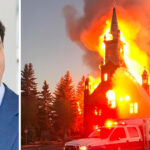Blog Post
With religious liberty increasingly under attack, how should Christians do politics?
By Jonathon Van Maren
Recently, I finished a fascinating book by Edmonton scholar Dr. Michael Wagner, Standing on Guard For Thee: The Past, Present, and Future of Canada’s Christian Right. I hadn’t been aware that a comprehensive history covering Canada’s journey from a largely Christian nation to a secular country governed by the tenets of the Sexual Revolution existed until recently, when I contacted Dr. Wagner inquiring about sources for another research project I’m currently working on. I finished the book the day before the Supreme Court’s decision on Trinity Western University came out, which seemed to put a gloomy conclusion to Wagner’s description of the seemingly endless string of defeats suffered by social conservatives over the past several decades. With the TWU case, the Supreme Court has made it clear: The religious freedoms of Canada’s Christians to study within their communities (and, inevitably, many others) are of “minor significance” (their exact words), and second-class minority status is now official.
And so the question presents itself: What next? What do religious groups do in a nation where the highest court in the land declares that the violation of religious liberty is of “minor significance,” with other such declarations sure to follow? How do they protect their own interests in the political arena when nearly a decade of Conservative Stephen Harper as prime minister produced the very judiciary that is chipping away at these fundamental freedoms in the first place? Christians and other traditionalist religious groups may be a minority, yes—but as of yet, there are still enough of us to make a substantial political impact, as the leadership races of both Andrew Scheer and Doug Ford have highlighted. So how do we ensure that the freedoms remaining to us—independent religious schools, the freedom to articulate our moral views in the public square, among others, are protected?
There are many different aspects to this question, of course, but I’d like to take a brief look at one way forward from a political perspective for a moment. As religious Canadians—at least, those who are aware of the growing threats to various fundamental freedoms—begin to note with alarm the legal and political trends in this country, they have responded in a variety of ways. Often, it is proposed that we should vote en masse for a small party like the Christian Heritage Party, irrespective of the fact that they have not managed to produce an elected politician in 31 years of existence. Some have suggested beginning a new party entirely, one that creates a values voting bloc open to the many other religious groups that share these values with Christians but would obviously feel excluded from the CHP. I believe the stakes are simply too high for Christian communities to essentially render void the influence we could have in parties where the possibility of extracting essential commitments exists.
To put it bluntly: Our communities need politicians defending our interests and giving voice to our concerns in the halls of power where the decisions that will dictate the future of our institutions are being made. With the TWU ruling and dangerous indicators in provinces across Canada that progressive politicians are entirely willing to malign and target Christian schools in the name of their ideology, we simply cannot afford to opt out of influencing those parties and politicians with a realistic opportunity to halt or reverse legislation that genuinely threatens the existence of Christian institutions. It is a simple fact, confirmed by every piece of available data and Supreme Court decisions to boot, that Canada is no longer a Christian nation, and has not been one for a very long time. Religious Canadians can no longer ignore what is taking place, because secular forces in this country have no intention of obeying their oft-repeated mantra of live and let live. They intend to force their values into Christian communities, and to do what they can to destroy those communities that refuse to comply. Simply look at what NDP Education Minister David Eggen is attempting to do to independent schools in Alberta if you have any doubt that this is happening.
Canadians of faith may be a minority, but we are still a substantial minority capable of an outsize impact in the political sphere if we choose to be so—but in order to be effective, we must start recognizing our minority status and acting accordingly. It is simply true that if we demand that politicians deliver a wholly social conservative agenda, we will be dismissed as unreasonable political actors unaware of how our democracy functions as well as unreliable voters and lobbyists eager to bash the politicians we hope will protect our interests and deliver on policy promises once they are elected. We must begin to function like an effective lobby group—one that realistically assesses our cultural position, decides on those policies and platform planks that are both achievable and, in this new era of attacks on Christian schools, absolutely essential for our communities, and then dedicates our resources and our political power to achieving those policy ends regardless if the leader or the politician we are lobbying is sympathetic to our worldview or our aims overall.
I want to pause here to point out the obvious: Yes, there are many consistent and principled social conservative politicians already dedicated to protecting our interests in both the House of Commons as well as provincial legislatures. Where we have the opportunity to campaign for, elect, and vote for such candidates, these politicians should be our highest priority. Many of these politicians are examples of the men and women who rise to power when the social conservative grassroots dedicates manpower and resources in politically and strategically savvy ways: In other words, when we play the game by the rules as they are rather than proclaiming how much we hate said rules. There is much to hate about the way the Canadian political system functions, not the least of which is the near-absolute power wielded by party leaders, enabling them to turf any candidate or expel any politician that they decide is no longer worth defending. But politics isn’t fair. Neither, we have been perennially discovering, are the courts. But that is the country we live in, this is the system we have, and we must face unpleasant realities if we wish to successfully protect the interests of our communities.
In part, this means that we must consider voting, as a bloc, for politicians willing to agree to policy planks and tangible legislative concessions that are needed by our communities even if we at times personally dislike those politicians or find them distasteful. Doug Ford, who responded to a question from Steve Paikin as to his religious affiliation by asking what he “needed to be,” is one example: If he keeps his promises, essential legislation protecting the conscience rights of physicians may be forthcoming. Nobody is under any illusion that Doug Ford is a social conservative, but from a purely pragmatic political perspective, he doesn’t need to be. We need legislation protecting conscience rights as well as a leader who can be counted on to defend independent schools. If Doug Ford is that leader, we simply can’t afford to ignore or spurn that opportunity. If betrayal is forthcoming, strategic political retaliation should also be forthcoming—but after that betrayal takes place, not before.
I want to reiterate in the strongest possible terms: With the precedent set by the recent TWU ruling as well as attacks on Christian schools across the country, we cannot afford to ignore political opportunities because the threats to faith communities are existential ones. What will we do if we lose the right to pass on our values to our children? What will we do if Christian education is wiped out in Canada—as many politicians and activists would like to see happen? What will happen to Christian medical professionals, lawyers, and others if they face the choice between career termination or profound ethical compromise? There may be many answers to those questions, but the political answer is to wield the influence and resources that we do possess to fight tooth and nail for the freedoms that we still have—and need as a simple matter of political survival. For the sake of upcoming generations—and as a young parent, I mean that with utter seriousness—we cannot afford to do otherwise.
One example that partially illustrates this point is the reaction to a number of pro-life and pro-family organizations to Donald J. Trump winning the Republican presidential primaries. At that point most people, myself included, dismissed the idea that Trump would be an ideological ally on the fundamental issues of life, family and freedom—but the Susan B. Anthony List decided that while they might not want to campaign for Trump the man, they needed to approach him as a powerful lobby group approaches a politician. In exchange for their willingness to work towards his election, the SBA List extracted a list of promises that included the defunding of Planned Parenthood and pro-life judicial nominees, among others. Pro-life leaders almost universally refused to defend much of Trump’s behavior and rhetoric, simply reiterating the obvious: We support this candidacy because we have been promised policies that we want. Our support is not personal support, it is contingent support—a political arrangement. Even skeptical pro-lifers have marveled at just how much Donald Trump has done for the pro-life cause in return for the support he received during the presidential election.
This point is an important one because often, voters of faith confuse voting for a candidate who may be promising much-needed policies—again, let’s use the example of Doug Ford and conscience rights—with endorsing everything a particular candidate has done, said, or advocates for. That is not the case. When we function as a lobby group attempting to secure policies that protect our communities, we don’t simply discard a candidate because they are not perfect. In a nation where we are a minority, we aren’t going to get perfect candidates–at least, the vast majority of the time we won’t. We aren’t voting for someone because we think they are paragons of virtue, we are voting for them in an explicitly transactional fashion: In exchange for our support, they have promised us X. If they don’t deliver, we move our support, because we only ever supported them in order to achieve that specific policy goal. No Trump Train, or Ford Nation, or anything else—just a purely transactional relationship.
I know many people despise this approach to politics because it feels like compromise. I don’t believe it is compromise, since especially from our current cultural position, we are simply attempting to preserve the freedoms that we have. When Dr. Jordan Peterson, who studied totalitarianism for decades, was asked what he had to say to Christians in Canada, his warning was blunt: “Better stand up for yourselves, because your religious rights are very low on the rights totem pole at the moment—and that’s going to get worse, a lot worse, before it gets better. So if you think your religious freedom is worth having, you better be ready to defend it.”
And when he was asked how, Peterson pointed out that in a democracy, the political realm is where freedom lives and dies: “It’s probably time to vote. It’s probably time to take an active role in the political world. I mean, our political institutions are quite functional compared to most political institutions. People don’t use them, and that’s generally because they work so well that you can ignore them. But I don’t think we’re at a point right now where you can avoid making the political personal, and that’s a sign that things are destabilized. If the traditional types are concerned about preserving what they have, and also having the right to continue to engage in their faith-based activities, then they better take a good, hard look at the people who are opposing that and decide what they’re going to do about it.”
That’s precisely what Christians need to do.
__________________________
For anyone interested, my book on The Culture War, which analyzes the journey our culture has taken from the way it was to the way it is and examines the Sexual Revolution, hook-up culture, the rise of the porn plague, abortion, commodity culture, euthanasia, and the gay rights movement, is available for sale here.









Christian education will not be wiped out in Canada, and governments will not cut funding to these organizations that are serving the public good. They will lose at the polls and they know it.
But Christian schools do need to be doing their job for the right reasons, just like the public school should be allowed to operate for the right reasons.
Public education is not limited to the secular school. Funding for the students should follow the students. If they are attending at private Christian school, full funding should follow them.
The government needs to stop using the children to promote their ideologies.